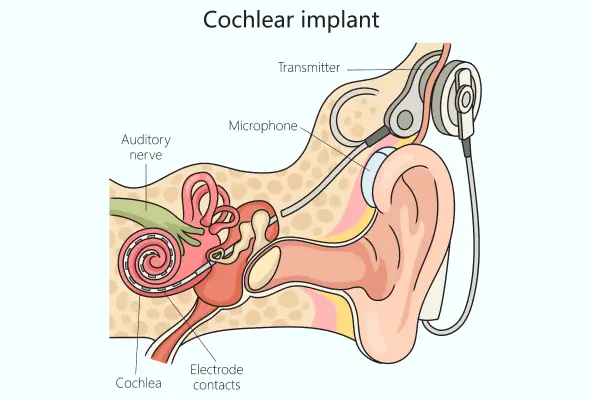-
Doctors
-
Specialities & Treatments
Centre of Excellence
Specialties
Treatments and Procedures
Hospitals & Directions HyderabadCARE Hospitals, Banjara Hills CARE Outpatient Centre, Banjara Hills CARE Hospitals, HITEC City CARE Hospitals, Nampally Gurunanak CARE Hospitals, Musheerabad CARE Hospitals Outpatient Centre, HITEC City CARE Hospitals, Malakpet
HyderabadCARE Hospitals, Banjara Hills CARE Outpatient Centre, Banjara Hills CARE Hospitals, HITEC City CARE Hospitals, Nampally Gurunanak CARE Hospitals, Musheerabad CARE Hospitals Outpatient Centre, HITEC City CARE Hospitals, Malakpet Raipur
Raipur
 Bhubaneswar
Bhubaneswar Visakhapatnam
Visakhapatnam
 Nagpur
Nagpur
 Indore
Indore
 Chh. Sambhajinagar
Chh. SambhajinagarClinics & Medical Centers
Book an AppointmentContact Us
Online Lab Reports
Book an Appointment
Consult Super-Specialist Doctors at CARE Hospitals

Cochlear Implant
Cochlear Implant
Cochlear Implant Surgery in Hyderabad
A cochlear implant is an electronic device that aids in hearing. It is placed inside the ear called the cochlea (a spinal-shaped bone on the inner side of the ear) and convert sound into electrical impulses, which are interpreted by the brain. It replaces the cochlea’s function.
A cochlear implant is beneficial for patients with severe hearing loss. However, the device isn’t suited for everyone and there are many complications if it’s not used properly. Using a cochlear implant successfully needs quite a lot of therapy and training. CARE Hospitals offers cochlear implant surgery in Hyderabad with high success rates.

What is a Cochlear implant?
A cochlear implant is a tiny electronic device that helps in the improvement of hearing loss in both adults and children. This device consists of external and internal components and it works through the electrical stimulation of the cochlear nerve. The external component has a microphone which is located behind the ear. The internal portion is under the skin and behind the ear. Here the digital signal is converted to electrical impulses. Further, these impulses stimulate the cochlear nerve which is forwarded to the brain.
When is a cochlear implant recommended?
A cochlear implant is recommended in the following situations:
-
People suffering from complete hearing loss.
-
Hearing aids are not able to fulfill the hearing needs
-
If there is a loss of hearing disturbing the communication.
After the examination, an ENT specialist will determine if the device is perfect for you or not.
Types of hearing loss
There are three types of hearing loss. They are:
- Sensorineural hearing loss: It is a type of hearing loss that is permanent and caused by damage to the auditory nerve.
- Conductive hearing loss: It is usually caused by damage to the outer or middle ear. This can be either temporary or permanent.
- Mixed hearing loss: It is the combination of both sensorineural and conductive loss. In this, usually, the sensorineural loss might be because of the wax accumulation.
When will the implant not work?
Sometimes the doctors cannot restore the hearing if there is conductive hearing loss due to reasons like:
-
the ear canal is abnormally narrow
-
thickening of the bone which surrounds the ear canal
-
abnormal bone growth in the middle ear
-
abnormal separation of the middle ear bones
-
usage of traditional hearing aids
What are the advantages of the cochlear implant?
If there is severe hearing loss, getting a cochlear implant surgery will be perfect and also improve the quality of life. Some of the benefits of this device include:
-
will be able to perceive loud, medium, and soft sounds
-
Hear the footsteps without any problem
-
Can have and comprehend speech
-
Can hear clearly over the phone
-
Can hear music
-
Watch TV
Cochlear implant surgery procedure
Surgery is done by giving local anesthesia. The surgeon will make the incision behind the ear after the indentation is done. The surgeon will then make a hole in the cochlea and insert the electrodes. The next step they do is to insert the receiver behind the ear. This further is secured to the skull and the incision is stitched.
Once the completion of the surgery, you will be transferred to the recovery room to monitor if there are any side effects. You will be either discharged in a few hours or the next day. The surgeon will add the external part. After the addition of the external part then the internal parts will be activated.
You will be instructed on the necessary precautions to take care of the incision. Regular checkups are important so that the doctors can check the progress of healing.
What are the risks associated with cochlear implants?
Some of the risk factors that patients can experience in rare cases include:
-
There could be some bleeding.
-
There might be swelling.
-
Sometimes you will experience ringing in the ear.
-
There can be an infection in the area.
-
There could be a change of taste.
-
There can be a chance of facial paralysis.
-
While swimming or taking a bath you have to remove the external component.
-
Needs rehabilitation to learn the workings of implants.
-
Need to recharge the batteries regularly.
-
There can be a chance of damage to the implant during sports activity.
At CARE Hospitals, doctors come with a vast experience and understanding of cochlear implants to ensure you are given the right treatment and perform successful Cochlear implant surgery in Hyderabad or any of our other facilities. Our world-class infrastructure and use of advanced technology make it easier for us to conduct even the most complex cochlear implant procedure easily. If you want to learn more about cochlear implants, visit us today!
To find out more about the cost of this procedure, click here.
Frequently Asked Questions
Still Have a Question?

